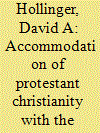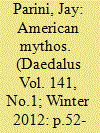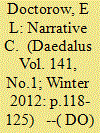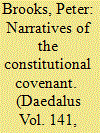|
|
|
Sort Order |
|
|
|
Items / Page
|
|
|
|
|
|
|
| Srl | Item |
| 1 |
ID:
110130


|
|
|
|
|
| Publication |
2012.
|
| Summary/Abstract |
Throughout its history, the United States has been a major site for the accommodation of Protestant Christianity with the Enlightenment. This accommodation has been driven by two closely related but distinct processes: the demystification of religion's cognitive claims by scientific advances, exemplified by the Higher Criticism in Biblical scholarship and the Darwinian revolution in natural history; and the demographic diversification of society, placing Protestants in the increasingly intimate company of Americans who did not share a Protestant past and thus inspiring doubts about the validity of inherited ideas and practices for the entire human species. The accommodation of Protestant Christianity with the Enlightenment will continue to hold a place among American narratives as long as "diversity" and "science" remain respected values, and as long as the population includes a substantial number of Protestants. If you think that time has passed, look around you.
|
|
|
|
|
|
|
|
|
|
|
|
|
|
|
|
| 2 |
ID:
110128


|
|
|
|
|
| Publication |
2012.
|
| Summary/Abstract |
This essay examines the notion of an American narrative, looking at a variety of myths that have been prominent and that have, in various ways, shaped the concept of a nation devoted to Enlightenment and Anglo-Saxon ideals. These include liberty, equality, and justice, which can be traced to thinkers such as Montesquieu, as well as ideals laid out in the Magna Carta. These lofty ideals took the place of more traditional narratives and tribal alliances, and they helped establish a nation that had been formed by so many different immigrant strands. That these stories - going back to the Puritans landing on Plymouth Rock, for example - have been influential seems beyond question. Yet it remains difficult to assess their broader value in determining the course of a nation. How might these founding myths prove useful in refashioning the American stories in ways that, in the future, could be productive?
|
|
|
|
|
|
|
|
|
|
|
|
|
|
|
|
| 3 |
ID:
110125


|
|
|
|
|
| Publication |
2012.
|
| Summary/Abstract |
Nearly four centuries of American history have witnessed the evolving conflict between two competing sets of values: a belief that acting on behalf of the common good should guide social and political behavior, and a belief that unfettered individual freedom should dominate political and social life. Tracing this conflict from Puritanism through the American Revolution, the Civil War, the rise of industrialism, the Progressive Era, the New Deal, the Great Society, and the conservative revival of the Nixon/Reagan era, the essay reveals this clash of values as pivotal to understanding the narrative of American history, with contemporary political battles crystallizing just how basic this conflict has been.
|
|
|
|
|
|
|
|
|
|
|
|
|
|
|
|
| 4 |
ID:
110126


|
|
|
|
|
| Publication |
2012.
|
| Summary/Abstract |
America has always been a wonderfully diverse place, a country where billions of stories spanning centuries and continents converge under the rubric of a Constitution that unites them in an ongoing narrative of national self-creation. Rather than rehearse familiar debates over what our Constitution means, this essay explores what the Constitution does. It treats the Constitution as a verb - a creative and contested practice that yields a trans-generational conversation about the meaning of our past, the imperatives of our present, and the values and aspirations that should point us toward our future. And it meditates on how this practice, drawing deeply on the capacious wellsprings of text and history, simultaneously reinforces the political order and provides a language for challenging its legitimacy, thereby constituting us as "We, the People," joined in a single project framed centuries ago that nevertheless remains inevitably our own.
|
|
|
|
|
|
|
|
|
|
|
|
|
|
|
|
| 5 |
ID:
110136


|
|
|
|
|
| Publication |
2011.
|
| Summary/Abstract |
The Broadway musical is an excellent prism for viewing the narrative of American life - as it is, has been, and perhaps should be. In the first part of the twentieth century, musicals viewed life through rose-colored glasses; musicals were equivalent to musical comedy. Starting in the 1940s, the mood of musicals darkened. One indication of the new, serious tone was that characters in musicals died in the course of the show. This essay examines several questions relating to death in the Broadway musical, such as who dies, when in the course of the drama the death occurs, and how the death is marked musically. It concludes with a look at musicals involving the deaths of historical characters and at AIDS-related musicals, works whose assumptions and ideals are very far from those of the musical comedies of the early twentieth century.
|
|
|
|
|
|
|
|
|
|
|
|
|
|
|
|
| 6 |
ID:
110132


|
|
|
|
|
| Publication |
2012.
|
| Summary/Abstract |
Seven years after 9/11, the American way of life was again shaken to its foundation by the Great Recession of 2008. The logic of an unregulated market economy produced its predetermined result. The American middle class, the historic protagonist of the American narrative, became an endangered species. Against a bleak backdrop of indebtedness, unemployment, and rapid decline in traditional jobs and in the affordability of the essentials of health and education stands the stark wealth of the top 1 percent of Americans. With the vital center no longer holding and consensus fraying, 53 percent of the electorate wagered in 2008 that it could deny race by affirming its non-importance and thereby audaciously reinvigorate the exceptionalist narrative. The choice before us, however, is still much the same as that posited by W.E.B. Du Bois when he described two antithetical versions of the American narrative: one was based on "freedom, intelligence and power for all men; the other was industry for private profit directed by an autocracy determined at any price to amass wealth and power."
|
|
|
|
|
|
|
|
|
|
|
|
|
|
|
|
| 7 |
ID:
110133


|
|
|
| 8 |
ID:
110127


|
|
|
|
|
| Publication |
2012.
|
| Summary/Abstract |
The constitutional narrative plays perhaps a surprisingly important role in American society. It claims to unfold present judgment from past precedent, according to the doctrine of stare decisis, given an eloquent exposition by the Supreme Court in Planned Parenthood of Southeastern Pennsylvania v. Casey, where the Constitution is referred to as a "covenant" among generations. Analysis of this and other covenantal narratives spun by the Court suggests that despite the emphasis on precedent they may work according to the retrospective logic of narrative itself, in which elements become functional in terms of what follows them. Plots work from end to beginning, reinterpreting the past in terms of the present. The Supreme Court opinion, when subjected to an analysis sensitive to its narrative rhetoric, suggests something akin to the structure of prophecy and fulfillment in its composition of the covenantal narrative.
|
|
|
|
|
|
|
|
|
|
|
|
|
|
|
|
| 9 |
ID:
110129


|
|
|
|
|
| Publication |
2012.
|
| Summary/Abstract |
Anglo-American westward expansion provided a major impulse to the development of the young United States' narrative tradition. Early U.S. writers also looked to the South, that is, to the Spanish New World and, in some cases, to Spain itself. Washington Irving's "A History of the Life and Voyages of Christopher Columbus" (1828), the first full-length biography of the admiral in English, inaugurated the trend, and Mark Twain's "Life on the Mississippi" (1883) transformed it by focusing on the life and lives of the Mississippi River Valley and using an approach informed by Miguel de Cervantes's "Don Quijote de la Mancha." From Irving's "discovery of America" to Twain's tribute to the disappearing era of steamboat travel and commerce on the Mississippi, the tales about "western waters," told via their authors' varied engagements with Spanish history and literature, constitute a seldom acknowledged dimension in Anglo-America's nonfictional narrative literary history.
|
|
|
|
|
|
|
|
|
|
|
|
|
|
|
|
| 10 |
ID:
110134


|
|
|
|
|
| Publication |
2012.
|
| Summary/Abstract |
This essay explores the suggestion that many American narratives are supplementary, correcting narratives - alternatives to the main story on offer. The guiding thought is that of Henry James's "possible other case," and the chief example is Cormac McCarthy's "No Country for Old Men," in which one story after another fails to cope with the ongoing mystery it faces. The novel may imply, then, that narrative itself, rather than any individual report or fiction, is in crisis or has come to the end of its road. A coda to the essay proposes the option of nonnarrative understandings of the world in those extreme situations where storytelling is no longer the sense-making activity we so often take it to be.
|
|
|
|
|
|
|
|
|
|
|
|
|
|
|
|
| 11 |
ID:
110135


|
|
|
|
|
| Publication |
2012.
|
| Summary/Abstract |
The blending of oral traditions, visual arts, and music has influenced how Southern writers shape their region's narrative voice. In the South, writing and storytelling intersect. Mark Twain introduced readers to these storytellers in "Adventures of Huckleberry Finn." Twain blends both black and white voices within Huck's consciousness and awareness - in Huck's speech and thoughts - and in his dialogues with Jim. A narrative link exists between the South's visual artists and writers; Southern writers, after all, live in the most closely seen region in America. The spiritual, gospel, and rock and roll are musical genres that Southern writers love - although jazz, blues, and ballads might have the most influence on their work. Southern poets and scholars have produced anthologies, textbooks, and literary journals that focus on the region's narrative voice and its black and white literary traditions. Southern writers have created stories that touch the heart and populate American literature with voices of the American South. Future Southern writers will continue to embrace the region as a place where oral, visual, and musical traditions are interwoven with literature.
|
|
|
|
|
|
|
|
|
|
|
|
|
|
|
|
| 12 |
ID:
110131


|
|
|
|
|
| Publication |
2012.
|
| Summary/Abstract |
The old law of domestic relations and the system known as coverture have shaped marriage practices in the United States and have limited women's membership in the constitutional community. This system of law predates the Revolution, but it lingers in U.S. legal tradition even today. After describing coverture and the old law of domestic relations, this essay considers how the received narrative of women's place in U.S. history often obscures the story of women's and men's efforts to overthrow this oppressive regime, and also the story of the continuing efforts of men and some women to stabilize and protect it. The essay also questions the paradoxes built into American law: for example, how do we reconcile the strictures of coverture with the founders' care in defining rights-holders as "persons" rather than "men"? Citing a number of court cases from the early days of the republic to the present, the essay describes the 1960s and 1970s shift in legal interpretation of women's rights and obligations. However, recent developments - in abortion laws, for example - invite inquiry as to how full the change is that we have accomplished. The history of coverture and the way it affects legal, political, and cultural practice today is another American narrative that needs to be better understood.
|
|
|
|
|
|
|
|
|
|
|
|
|
|
|
|
|
|
|
|
|